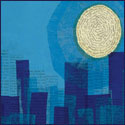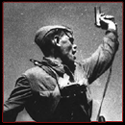|
chachu posted:Ha, it's actually One by U2. v Not dumb at all! Especially for a beginner! Ohhh, I see what's happening here. You have a piano score of a vocal piece of music. So the version of One that you hear on the radio has music - played by what, guitar, strings, whatever - and you also hear Bono singing. I'll bet anything the music you have has attempted to put all of that, both the instrumental part and the vocal part - into what you're playing. And if the instrumental part includes anything in the trebble and the vocal part is in the trebble they're occupying the same staff at the same time. So if there's a part in the song where the instrumentals are resting and Bono isn't singing, you have two rests at once, in the same place. I used to play a lot of that stuff - I was the accompianist for my high school chorus and a lot of my friends were into drama club so they would have me accompany them when they tried out and such. I always found it very annoying that they didn't just publish the instrumental part by itself, it's a lot harder to play both and also kinda pointless if someone is singing the vocal part anyway. 
|
|
|
|

|
| # ? May 22, 2024 10:17 |
|
Bob Shadycharacter posted:Not dumb at all! Especially for a beginner! Ohhhhh, that makes sense! Thank you! Listening to the song itself clears it up--I get it.
|
|
|
|
Hi thread. I just started learning piano as my first instrument, and luckily my teacher lent me a crappy Yamaha to get started, but I'd like to buy something with full-width, weighted keys (and 88 of them) to last me a year or two. I found a good deal on the Casio PX-120 locally for about $350, or the PX-110 for $200. These sound alright, except for a really disconcerting review on amazon: http://www.amazon.com/gp/cdp/member-reviews/AEKEY1PYVIIXS/ref=cm_pdp_rev_more?ie=UTF8&sort_by=MostRecentReview#RE6Z6M5NCSDDP quote:* The samples are problematic for 3 notes: the second D#, E and F above middle C. There is a noticeable metallic rattle or buzz when these notes are struck firmly. Very annoying, especially with headphones. How could Casio let the product go out the door with this flaw? The PX-320 has the same problem (I went back to the store and checked the floor models with headphones). Is this true? That's terrible. I'm scared to get a casio now. If anyone can verify it, is it really so bad, or a minor audiophile nitpick?
|
|
|
|
Bob Shadycharacter posted:Henles are awesome and totally worth the extra money. I always trust Henles to be the best, yes. They also cost an arm and a leg. Usually, Dover editions are much cheaper, but are still quite excellent. Dover basically takes "good" old editions of pieces (that have often gone past copyright and into public domain (I think?), so theoretically you could get them for free) and republishes them. Often the music is printed more cramped and harder to read, though, based on the font they chose. Henles are still much easier on the eyes. Schirmer, Kalmus, etc. are usually quite terrible (by which I mean "filled with 'personal touches' from the editors" -- I guess there was a trend where heavy editing was encouraged at one point, but seems like we're more "back to basics" now). chachu posted:Er, I'm just starting to learn piano and I think I'm really improving with reading sheet music. I do have a question though--what the heck do I do when there's a quarter rest on TOP of a half note? I can't find the answer anywhere. Think about singing songs in rounds with a friend, like "Row, Row, Row Your Boat." Both of you are singing a melodic line on top of each other. (Each of these melodic lines is a voice.) You're both singing separate lines, but you're singing them together. Now imagine playing two people singing separately melodies, but in the same hand. That's pretty much what "voices" mean. As Bob Shadycharacter said, printed music usually represent the "two separate melodies" thing by having noteheads in the top melodic line point up, and noteheads in the bottom line point down. A rest on top of a note just means there's a rest in the top melody, whereas the bottom melody keeps going. You can ignore it and keep playing as it looks. It's just a notational formality. If you to be anal and technical about playing things correctly, make sure you also hold on to each of the notes in each melodic line as long as you're supposed to! If all this is going on in your right hand, and there's a half note in the top line with a bunch of stuff going on in the bottom line, make sure you hold your pinky down for the entire duration of a half note while the rest of your fingers handle the bottom line. True polyphonic piano pieces aren't easy to play, so don't get discouraged! e: Didn't notice posts in the last page, whoops. dudemanbudguy posted:No! I totally appreciate the explanation. I honestly don't mind doing drills for hours, but I'll go to the music store and try to find an easy etude book because I think there's a lot of stuff about music drills just don't teach. Yeah, I'd see Hanon as more "drills". I don't know much about etudes written for modern-day teaching methods, but Carl Czerny is the classic etudes dude that piano students have been growing up with for years. (He also taught Liszt, who's probably one of the greatest pianists ever.) He wrote a bunch of books for a variety of difficulties. Most of the pieces are nothing "special" musically, but they're nice, pleasant tunes that can help stave off the boredom. Beginners typically start out with Op. 599. A little less famous, but you might also want to check out Burgmüller, who has a smaller repertoire of etudes. Just please, for the love of God, don't look up Chopin/Liszt/Rachmaninoff etudes. You can put those off until you're applying for conservatory and trying to get a degree in piano performance. Their etudes are pretty standard audition pieces. facepalmolive fucked around with this message at 05:06 on Sep 6, 2010 |
|
|
|
Well. Thanks for posting those suggestions, and for everyone who is a cheap bastard like me: http://books.google.com/books?id=4lNSmRkIfu8C&lpg=PA2&ots=FZEWdrLQDh&dq=Op.%20599%20hanon&pg=PA12#v=onepage&q&f=false http://books.google.com/books?id=jiBdEsmCsT4C&lpg=PP1&dq=Op.%20599%20hanon&pg=PA3#v=onepage&q&f=false
|
|
|
|
Can anyone tell me what genre this charmingly cheerful piano ditty is? It's an excerpt from The Rocky Horror Show ("I Can Make You A Man"). I'm a beginner but I'd love to be able to play like that. Also, would anyone know of any similar sounding songs? Thanks. http://www.tindeck.com/listen/ytkm
|
|
|
|
Lusername posted:Can anyone tell me what genre this charmingly cheerful piano ditty is? It's an excerpt from The Rocky Horror Show ("I Can Make You A Man"). I'm a beginner but I'd love to be able to play like that. Also, would anyone know of any similar sounding songs? Thanks. http://www.tindeck.com/listen/ytkm Sounds like ragtime to me. Here's one of my favorite ragtime pieces, Maple Leaf Rag. http://www.youtube.com/watch?v=0B04--XmZiE
|
|
|
|
Thanks DukAmok, that's perfect! I thought it might be something you'd hear in a silent film, but couldn't quite put my finger on it. Maple Leaf Rag shall be going on my to-learn list.
|
|
|
|
Lusername posted:Thanks DukAmok, that's perfect! I thought it might be something you'd hear in a silent film, but couldn't quite put my finger on it. Maple Leaf Rag shall be going on my to-learn list. The Maple Leaf is a great piece, and not really as difficult as it sounds. It's one of the earliest "real" piano pieces I learned. That said, it still does have some technical challenges; the left hand 'stride' style can be tricky at first, and when it goes into D flat (around 1:30 in the vid) it gets waaaay harder. Ragtime rules so much though, try to get a book with a lot of Joplin's other pieces if possible. Pineapple Rag, Bethena Waltz, Solace, are all pretty sweet. Also watch The Sting.
|
|
|
|
Blog Free or Die posted:The Maple Leaf is a great piece, and not really as difficult as it sounds. It's one of the earliest "real" piano pieces I learned. Thanks very much for the tips and songs. I plan to watch The String this week. I've also been listening to Joplin's work and it's beautiful. I highly recommend it to, well, everybody. Such a great shame to hear he died penniless. I've found practising the left hand 'strides' has actually helped me play pieces that don't have the left hand leaping all over the keys - they feel so much easier in comparison. I reckon it's definitely something other novices should give a go if you're having trouble taming your lefty.
|
|
|
|
Lusername posted:Thanks very much for the tips and songs. I plan to watch The String this week. Sting, not String. But yea, ragtime is great for working on leaps. I'm currently working on two Chopin etudes that rely heavily on stride; opus 25 numbers four and nine. Number nine, also known as the Butterfly etude, sounds weirdly close to ragtime, it's awesome.
|
|
|
|
Everyone seems to ask about learning to sight read, because apparently you can all play songs that you hear by ear so easily. I am so, so very jealous of you! How can I learn to play music by ear? I played piano for years as a kid, but I eventually quit because I just couldn't give two shits about the music that I was playing (and all my friends were in choir anyway). I've started trying to rekindle my interest, and I really don't want to let myself get disillusioned and give up, so I want to play music that I like. But, when I sit down and try to bang something out by ear, I just. can't. do. it. I'll take 45 minutes to try and figure out just a few seconds of music, and sometimes the next time I sit down to play it, it sounds totally wrong and I have to start over. Lots of people seem to think of music in terms of chords, which seems like it would be easier, but I can't figure out how to listen for a whole chord until after I hear the individual notes - like if there's an arpeggio in a section of music, I never really realize that until I hear the notes individually and play them together, if that makes sense. I've only ever gotten one song playable without eventually just giving up and finding sheet music, and it took me HOURS of trying to find the right things to play. I'm not even playing all the complicated notes that are in the recording, but I think I'm getting the chords right. (It's Speechless by Lady GaGa, if you must know, and it has a really repetitive chord progression for the most part. Pop music is nice like that, I guess.) I've tried a handful of other songs, but everything is just so complicated that I can't do it. I've slowed down songs to half speed using Audacity and things, and practiced them, and I STILL can't do it. It's really frustrating me. What can I do to get better?
|
|
|
|
The short answer is "ear training". I took two semesters (maybe it was four? It was a lot anyway) of Ear Training class in college. It's learning to recognize intervals and rhythms, basically. Prof would play things on the piano and you'd have to go "major third" or "tritone" or "perfect fifth". Same deal with rhythms. Do you have a teacher? If so you could ask to incorporate some of that into lessons, maybe ten minutes at the end of a lesson every week or something. Also, a lot of this stuff just comes from lots of experience. I used to work with this guy who had taken a composing class, and he told me this story about how he'd written this pretty complicated piano piece, and he took it to his teacher and the guy sat down and just played it right off the bat. There was one section with a big chord way up above everything that was going on right before it - so a big leap, right? - and the guy hit it perfectly without looking for it or anything. And he said "How did you do that?" and the guy said "Well, it just made sense that it would be an E major chord there so I knew". That's more of a sight reading example but it works the same way.
|
|
|
|
vlack - http://www.musictheory.net/exercises You're on the right track, just start simpler so you don't get frustrated. Just like you don't get to play Chopin your first day on the piano, you don't get to try to decode an entire piece of music with multiple voices and multiple instruments and complicated rhythms on your first day of ear training. If you still want to try "real" songs I would recommend something like a Bach chorale. Homogeneous instruments and rhythms makes things a lot easier to parse.
|
|
|
|
One thing that helped my ear a lot was whistling. Try whistling whatever you're working on, and really try to get the pitch as close as you can. Or singing or humming or whatever works for you.
|
|
|
|
Blog Free or Die posted:One thing that helped my ear a lot was whistling. Try whistling whatever you're working on, and really try to get the pitch as close as you can. What's funny is that I can do this really easily for the melody, but when I try to figure out what's going on underneath the melody that part of my brain totally stops working. Particularly trying to hear a whole chord is just terrible... I can't tell the difference between a C chord and a G chord when someone else is playing them in a song surrounded by other notes and voices.
|
|
|
|
vlack posted:What's funny is that I can do this really easily for the melody, but when I try to figure out what's going on underneath the melody that part of my brain totally stops working. Particularly trying to hear a whole chord is just terrible... I can't tell the difference between a C chord and a G chord when someone else is playing them in a song surrounded by other notes and voices. That's exactly what ear training is trying to address. The alternative is just to listen to a lot of music. And I mean a LOT. After awhile you'll start to differentiate between "this sort of sound" vs. "this other sort of sound." That's the thing with music -- a lot of it's very formulaic and have certain patterns to them (this is why harmony and music theory classes exist), so once you begin to sense that pattern, the rest should fall in place. Recognizing chords is different from recognizing melodies, at least for me. Don't try to pick out individual notes in a chord, but rather, learn to recognize the sound of a chord as a whole. When you play it back, it really isn't terribly important if you missed a note or two, as long as it still sounds like a C chord. Nobody could tell the difference, anyway. Are you actually trying to pick out C chords and G chords specifically from a song? Because... don't. Many great musicians never pick up perfect pitch throughout their lives and they do just fine without it. It's much more useful for you to be able to pick out "this is a V chord" and "this is a I" rather than "this is a G" and "this is a C". The V-I chord progression is one of the most common patterns throughout both classical and modern (Western) music, so that's probably the first pattern you should listen for and recognize, if that helps as a starting point. But just like with anything, formalized training is definitely the faster way to get there. facepalmolive fucked around with this message at 21:53 on Sep 20, 2010 |
|
|
|
facepalmolive posted:Many great musicians never pick up perfect pitch throughout their lives and they do just fine without it. My piano teacher has perfect pitch, and in some ways it sounds like it's kind of a pain in the rear end. I'd rather have really good relative pitch, actually.
|
|
|
|
Perfect pitch IS a pain in the rear end. I don't have it either and thank god. I've known piano tuners who have it and it drives them loving apeshit (sometimes tuning drives me goddamn apeshit too, it must be ten times worse with perfect pitch). Relative pitch is far more useful!
|
|
|
|
I don't know if he's especially weird, but he tells me he absolutely can not play a digital keyboard that's key transposed, like his musical world view collapses if pressing 'C' produces 'D'. He's insanely good and can transpose sheet music mentally on the fly though, so for him that's no big deal, but still, stuff like that must be annoying.
|
|
|
|
Does anyone know how innate perfect pitch is btw? Like, do people how have it hear the equal temperament tuning of the modern piano as out of tune for certain intervals where there's somewhat of a big difference from just intonation (like the major third)?
|
|
|
|
Arashikage posted:Does anyone know how innate perfect pitch is btw? Like, do people how have it hear the equal temperament tuning of the modern piano as out of tune for certain intervals where there's somewhat of a big difference from just intonation (like the major third)? The wiki page is pretty great.
|
|
|
|
Is a Casio PX-700 any good? Working with a budget of about £200. It's to sit in the corner of my university halls of residence bedroom as a present to myself for getting in to university and surviving my first week. £200 is absolutely nothing for a hammer-weighted keyboard so I'd be surprised if I could do much better.
|
|
|
|
For those of you that are into jazz/blues/improvision, do you know any good books to check out? I know a lot of theory so it can be theory intensive. I'd just like to be as good at improvising on piano as I am on guitar. Thanks!
|
|
|
|
dudemanbudguy posted:For those of you that are into jazz/blues/improvision, do you know any good books to check out? I know a lot of theory so it can be theory intensive. I'd just like to be as good at improvising on piano as I am on guitar. Thanks! I am not into improvisation (I wish I could!) but I do have a book called "The Way of the Hand" which is pretty interesting and couldn't hurt to check out.  It seems to be about improvising based on shapes and patterns rather than actually thinking about scales and modes while you do it. It seems to be about improvising based on shapes and patterns rather than actually thinking about scales and modes while you do it.
|
|
|
|
dudemanbudguy posted:For those of you that are into jazz/blues/improvision, do you know any good books to check out? I know a lot of theory so it can be theory intensive. I'd just like to be as good at improvising on piano as I am on guitar. Thanks! I used to have a copy of The Jazz Piano Book and really need to pick another one up. I haven't had it for years, but from what I recall it was pretty comprehensive. And awesome.
|
|
|
|
I know I asked this before here, but is the PX 130 perfectly fine for an absolute beginner? It's still pretty pricey, upwards of $500 is a good deal in Canada. Costco actually had it and the bench for $450 last year which is a great deal. No MIDI but can connect to PC via USB. I can't buy one right now, but I'm just wondering for the near future. I don't have time or money for proper classes as well.
|
|
|
|
What's your goal with learning piano? Because in my personal opinion, if you are an absolute beginner and your interest stretches to maybe someday playing an electronic keyboard with a band, you don't even need weighted keys. Just pick up any old thing with keys. Find someplace with a "real" piano to play on every now and then. Around here there are pianos at parks, some casual restaurants, the college, and so on. I realize I'm not saying "do it RIGHT" and I feel a little hypocritical because I definitely say that in other threads around here. But if you are delaying learning anything about piano because you can't afford a $600 Casio...go pick up a little one for a hundred bucks. But to answer your original question - the specs look nice. Of course, feel and sound are the most important parts of the product, and I don't know that piano personally. Also, I feel obligated to mention that I have a Casio that came with that same pedal assembly, and it totally loving broke (been about a year and a half). Something inside the sustain pedal got stuck on something else and it's permanently in a "down" position now. 
|
|
|
|
Hawkgirl posted:It's actually good for me because it's really clearly showing how much I depend on that stupid pedal (even though it's stuck down it's not actually sustaining anything). I don't like practicing anymore though. Only play Bach, and pretend you're Glenn Gould  suitcase of drugs optional, but recommended
|
|
|
|
Blog Free or Die posted:Only play Bach, and pretend you're Glenn Gould I knew Gould was an autistic, but a drug addict too?
|
|
|
|
I'm no Gould scholar, but iirc he was a pretty heavy user, and it may have contributed to his death? I need to rewatch 32 Short Films About Glenn Gould.
|
|
|
|
From what I remember, he took a lot of prescription medicine. He probably took more than he actually needed, but I don't think he was considered a junkie.
|
|
|
|
So, I've been playing for about a year and three months now, and I think the biggest problems with me are phrasing and dynamics. I understand what the music is supposed to sound like, but I'm probably playing too loudly. Any tips? Especially on parts for like Pathetique Mov. 1, right before the scale-y part, with the contrary motion octaves? I've listened to the masters do it, and yet, I can't seem to figure out what their secret(s) is/are. And by the way, don't say I'm playing too tensely, because I'm extremely conscious about that sort of thing -- it's one of the biggest things I worked on when I started with my new teacher.Blog Free or Die posted:The Maple Leaf is a great piece, and not really as difficult as it sounds. It's one of the earliest "real" piano pieces I learned. Maple Leaf Rag is pretty obnoxious, which is probably why I enjoy playing it. And also, the guy that plays The Entertainer in The Sting leaves out a whole section. postirony fucked around with this message at 08:37 on Oct 2, 2010 |
|
|
|
postirony posted:So, I've been playing for about a year and three months now, and I think the biggest problems with me are phrasing and dynamics. I understand what the music is supposed to sound like, but I'm probably playing too loudly. Any tips? Especially on parts for like Pathetique Mov. 1, right before the scale-y part, with the contrary motion octaves? I've listened to the masters do it, and yet, I can't seem to figure out what their secret(s) is/are. And by the way, don't say I'm playing too tensely, because I'm extremely conscious about that sort of thing -- it's one of the biggest things I worked on when I started with my new teacher. As my piano teacher used to tell me, "Anyone can play loud. Playing soft is what's much harder." It requires a lot more discipline and control. That said, the other tip he would sometimes give me is that, when the markings tell you "piano", it doesn't mean that you actually have to play soft. It just has to sound soft. That's when I started to pay attention and realized that he generally played louder than I usually do (he was a bigger guy), and even his soft parts were louder than mine. It's just that he could make the softer parts sound softer. I can't put my finger on exactly what it is. Maybe it has to do with phrasing, execution, etc. I don't think it's a case of "it's all relative", either -- I'd even venture to say that the actual volume range that a world-class pro could play isn't much bigger than yours or mine (however, his dynamic range is much wider). I mean, volume-wise, you could only eke out so much from a piano, and different pianos play at different volumes. Sorry, I realize that wasn't very helpful. I'm not telling you what to do, only what not to do. I guess my point is that you shouldn't focus so hard on making it actually come out softer, because that's not where the secret lies. See if you can play at normal volume, but just make it sound soft. facepalmolive fucked around with this message at 12:55 on Oct 2, 2010 |
|
|
|
postirony posted:So, I've been playing for about a year and three months now, and I think the biggest problems with me are phrasing and dynamics. I understand what the music is supposed to sound like, but I'm probably playing too loudly. Any tips? Especially on parts for like Pathetique Mov. 1, right before the scale-y part, with the contrary motion octaves? I've listened to the masters do it, and yet, I can't seem to figure out what their secret(s) is/are. And by the way, don't say I'm playing too tensely, because I'm extremely conscious about that sort of thing -- it's one of the biggest things I worked on when I started with my new teacher. Whenever I'm doing pianissimo bits, I move my hand as if my fingers are floating lightly through the air (opposed to forte/fortissimo bits where my hands are heavy and weighty feeling). That's kind of hokey-sounding, but I don't really know what else to tell you. Just wait until you get to try to bring out a melody that's being played in the middle of chords you're playing using the surrounding fingers, I still have no idea how that just clicked one day.
|
|
|
|
postirony posted:So, I've been playing for about a year and three months now, and I think the biggest problems with me are phrasing and dynamics. I understand what the music is supposed to sound like, but I'm probably playing too loudly. Any tips? Especially on parts for like Pathetique Mov. 1, right before the scale-y part, with the contrary motion octaves? I've listened to the masters do it, and yet, I can't seem to figure out what their secret(s) is/are. And by the way, don't say I'm playing too tensely, because I'm extremely conscious about that sort of thing -- it's one of the biggest things I worked on when I started with my new teacher. Playing soft is REALLY hard, yeah. The only thing I can suggest is to sit down and work on just that - playing soft. You really have to listen hard to what you're doing. Maybe just play one note over and over and don't just try to play soft but try to play the exact same volume each time. That way you can learn a sense of how much force equals how much volume, you know?
|
|
|
|
Bob Shadycharacter posted:Playing soft is REALLY hard, yeah. The only thing I can suggest is to sit down and work on just that - playing soft. You really have to listen hard to what you're doing. Maybe just play one note over and over and don't just try to play soft but try to play the exact same volume each time. That way you can learn a sense of how much force equals how much volume, you know? I totally understand how much more difficult playing piano is, and that's actually something I've been working on (playing things piano, regardless of dynamic marking). Business Octopus posted:Whenever I'm doing pianissimo bits, I move my hand as if my fingers are floating lightly through the air (opposed to forte/fortissimo bits where my hands are heavy and weighty feeling). That's kind of hokey-sounding, but I don't really know what else to tell you. Just wait until you get to try to bring out a melody that's being played in the middle of chords you're playing using the surrounding fingers, I still have no idea how that just clicked one day. I think I'm certainly getting better at that one. I'm working on Erlkonig - Schubert/Liszt transcription, and I think that's helped a lot in my understanding of what the melody is supposed to sound like in reference to its accompaniment. edit: I was in Guitar Center today, playing on some Roland V Piano something or other, and I can't believe how amazing I sounded (not to toot my own horn, but I've never experienced music like that coming from MY fingers). Could it be that neither of the spinets I play on could be as expressive as I personally could be? And if so, could I produce the same sound from playing on a grand? postirony fucked around with this message at 04:05 on Oct 3, 2010 |
|
|
|
postirony posted:I totally understand how much more difficult playing piano is, and that's actually something I've been working on (playing things piano, regardless of dynamic marking). Spinets are pretty much not very good. They're basically just too small to make a good sound. There are better quality ones and worse quality ones but...yeah. I went from a very GOOD quality upright piano (Yamaha P22) to a 5'8 Mason and Hamlin grand and it was like...I'm not even sure how to describe it. Huge difference.
|
|
|
|
Bob Shadycharacter posted:Spinets are pretty much not very good. They're basically just too small to make a good sound. There are better quality ones and worse quality ones but...yeah. I play on a grand at my teacher's, and there is a world of a difference. But the question I'm really asking is, is it easier to get a wider dynamic range on a grand?
|
|
|
|

|
| # ? May 22, 2024 10:17 |
|
postirony posted:I play on a grand at my teacher's, and there is a world of a difference. But the question I'm really asking is, is it easier to get a wider dynamic range on a grand? Oh, absolutely, yes. They're literally capable of being louder just from the size of the strings/soundboard (assuming we're not talking about a baby grand), and also since the action is more responsive it's easier to play soft with control. A spinet is so short that the action actually sits below the keys on a lot of models. This means that when you push down on the key, it pulls up on a dowel which in turn pulls down on the hammer assembly, so the whole thing is sort of spongey and there's actually a slight delay in the sound coming out. All of that makes it pretty hard to gauge how hard to hit the key and what's going to come out when you do.
|
|
|


















